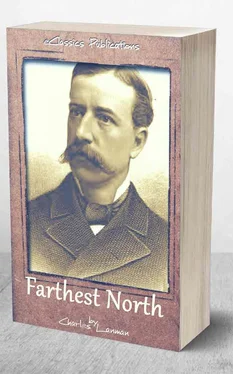In another place, after alluding to the extravagant accounts published about Arizona, he says: “One would suppose, from reading the pamphlet I send you, that Arizona is a fine agricultural country—which is absurd; and that it contains many flourishing cities and towns, whereas even the river-bottoms require irrigation, and the ‘cities’ are merely the nuclei of towns.”
On one occasion, after alluding to his enjoyment of the newspapers sent him from home, and to the early transfer of his regiment, he says: “It would probably have been removed this spring but for the financial panic and other commercial disasters. I suppose if the rest of the year goes by prosperously, and nothing occurs to prolong the gingerly, penny-wise, pound-foolish policy of Congress called economy (?), that the Twenty-third will probably be removed next spring or fall.” And again, he continues: “Grant appears to have obtained great credit by his veto of the Inflation Bill. How Congress could pass a bill which seems to be unacceptable and repugnant to the whole people, I can not understand.”
Alluding a second time to the pleasing characteristics of frontier life, he tells his father that “a party of Indian scouts arrived here yesterday from Schuyler’s command. They brought the news that the lieutenant had jumped the Indians at Four Peaks—a high mountain, forty miles off—killed eighteen and captured six. The party brought in a wounded scout, shot through the head, who is now in the hospital. He was the only one wounded in the fight, or rather slaughter, for these Indians rarely fight a party of any size. I suppose these Arizona tribes are the most degraded, cowardly, and despicable savages in the country. Schuyler, as I understand, generally sweeps a breadth of country fifty miles across, by means of flanking-parties on the right and left, and has been quite successful.”
In speaking of his duties at the post, he says: “I am officer-of-the-day every other day; I mount the guard every morning, attend all roll-calls, accompany the captain in his inspection of quarters every morning, and afterward recite tactics. I also am present with him at company-drill every evening, command the company at Sunday morning inspection, sit on boards of survey and perform other irregular duties.”
After announcing the arrival of the paymaster at the post, and alluding to expenses, he says: “Servants in this country are paid enormously. The post-trader pays his Chinese cook thirty dollars per month, and has paid as high as one hundred dollars. Officers in Arizona are compelled from necessity to employ soldiers in this capacity, though contrary to the regulations.”
In one of his letters, Lieutenant Lockwood gives his opinion about some of his father’s landed property, and then goes on after this fashion: “The old farm has additional charms for me now, after living in Arizona, and I have come to think that there are many worse places. Does distance lend enchantment to the view? or what is it? I often long after some of the delicious peaches and other fruit that the much-abused farm produces in such abundance. However, if you can dispose of the farm as you suggest, it will, no doubt, be for the best, as the Lockwood family have become so high-toned that I am afraid they will never stoop (?) to live on a farm and become grangers.”
In one of his letters written about this date, he makes the following remark respecting his education at Annapolis: “I don’t think I care about being present at the meeting of the alumni of my Alma Mater, or, what she would be more pleased with, contributing anything in the way of money. Enough has been thrown away in teaching me what has never been of any use. However, the old woman has my good wishes.”
In another letter, after speaking of an entertainment he had attended, he said: “I don’t know that I should have enjoyed it, but for the presence of a very pretty Spanish girl with whom I fell in love; she danced charmingly, but as she could not speak a word of English, nor I a word of Spanish, our conversation was somewhat limited.”
On the 4th of July when arrangements were commenced for removing the Twenty-third Regiment to Yuma, the lieutenant thus touches upon the national anniversary: “I have celebrated the day by being very busy writing up the proceedings of a board of survey, and have a like job on my hands for to-morrow; indeed, I shall be fully employed now till we leave. Some of the men, however, have been otherwise employed, viz., in parading before the guard-house with logs of wood on their backs, as the reward of a drunken frolic. Our march to Fort Yuma will doubtless be very disagreeable, and for two weeks we shall have dust and heat together with the fatigue of travel; but, on the other hand, the daily march will not be more than fifteen miles, and as we shall be well provided, I can’t say that I look forward to it with much dread. The wife of our captain is even now interesting herself in the culinary arrangements, so I presume the vitals will be good.” From the time of his uttering this amusing pun until the following September, the letters of young Lockwood give us no incidents of special interest, and we now follow him into the State of Nebraska, his regiment having been assigned to the favorite post of Omaha.
CHAPTER III. – ARMY-LIFE IN NEBRASKA.
Having entered upon duty at the barracks of Omaha, he seems to have made himself especially useful there, while enjoying some of the comforts of civilization, including good society. On the 25th of September, he wrote that he had been busy for a week as the recorder of a court-martial. “We settled nine cases, and, while we now stand adjourned sine die, I suppose the court will soon be reconvened to try half a dozen more men against whom charges have been preferred. There have been, since my arrival here, as many as sixty men in the guard-house, and courts-martial are the order of the day. I have to attend drills, etc., every day, and hence my leisure and opportunities for visiting the town have been limited. However, I did go last night to a concert in town given for the benefit of the grasshopper sufferers, several of these sufferers from the country being present. You can not realize what a nuisance these insects are in this country. I have not yet seen them in any numbers, or the effects of their ravages, but I am told they sometimes actually stop the railway-trains. The incredible number of bed-bugs in this country is another curious fact. I sleep so soundly that they do not disturb me. They infest every house at the post, and they are also numerous in the city, the fences between here and there being painted in many places, ‘Go to Smith’s for the great bed-bug buster.’” He became a favorite in the refined society of Omaha, at that time on the confines of civilization, but appearing to him like a bit of New York city cut off and set down in the wilderness, where, only a few years before, the buffalo ranged in his native freedom. During his residence at Omaha, young Lockwood was on the most friendly terms with all his fellow-officers, with one exception. After giving his father a very manly account of that trouble, he writes a paragraph about himself in these words: “With regard to myself, I find this army-life about what I expected. It has its pleasures and its crosses. I should prefer the cavalry to the infantry, and am sorry I did not apply for that arm of the service. I should like to remain in the army two or three years longer, I think, and yet, with a good opening, might do better in civil life. Promotion is very slow, and the accumulation of anything is not easy. These, of course, are rude impressions and but half formed, but, as you ask for impressions, I feel bound to give them just as they are. I have not been in the army long enough to rise, nor have I had the opportunity to gain any particular reputation, but suppose mine is as good as the average—that is, I think I have displayed as much aptitude for my profession as is generally exhibited by men of average ability, for of such I regard myself—perhaps below the average. I hope this peroration will answer your inquiries, and prove satisfactory in that respect. Excuse the necessary egotism. I will thankfully receive any advice or corrections which the reading of this, or your acquaintance with my characteristics, may suggest. I feel as though I had written a lot of foolishness; if you think so, please excuse.”
Читать дальше












